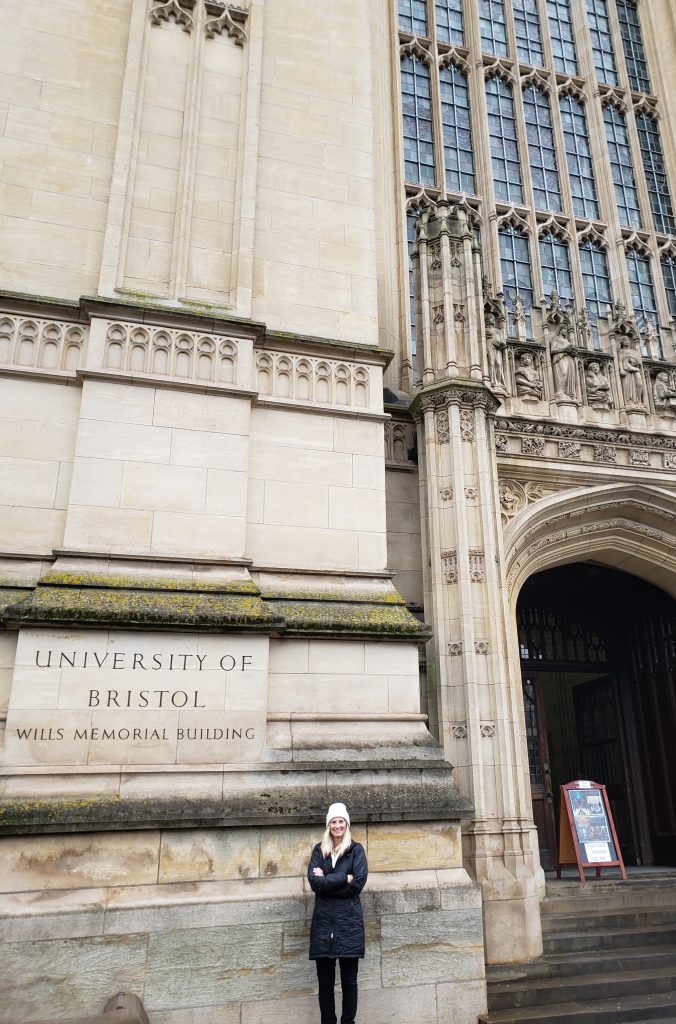Exploring College Options in the United Kingdom
By Kris Olson
December, 2019
Have you ever considered taking your college experience “across the pond?” And, no, I’m not talking about studying abroad for a semester; I’m talking about attending university as a degree-seeking, full-time student in the United Kingdom (UK). Depending on your major, or “course” as it’s referred to in the UK, you could potentially earn your bachelor’s degree in three years, gain valuable international experience and, in most cases, spend less than here in the United States. After a recent visit to the United Kingdom (UK), I discovered great options for students to study at some of the world’s top 100 universities.
Undergraduate Degrees
There are two different undergraduate degrees in the UK. In England, Wales, Northern Ireland or Scotland, American students can enroll in a 3-year undergraduate degree program and graduate with a Bachelor of Arts (BA) or Bachelor of Science (BSc). They can also opt for a 4-year “sandwich” course, which includes one year’s professional experience in industry or a year studying abroad. The three-year programs are more focused than our 4-year degree system in the United States; in the UK there is much less emphasis on general education courses and electives and a far more direct and focused approach to the field of study (hence you get your degree in 3 years!), saving you both time and money.
In Britain, there are also two types of programs from which to choose. Single-honors programs involve focused study of a single subject. The core of each program is already designed and you have the opportunity to shape your work by choosing additional modules. The Joint-honors programs/Combined programs enable you to study a combination of subjects, creating opportunities for you to build a degree program to suit your personal interests and needs. The university, however, designs the combination of majors/subjects – students do not have the option to combine subjects themselves.
If Scotland piques your interest, maybe St. Andrews University for instance, they will follow a system that is more similar to the US one. In fact, the American university education system is modeled after the Scottish system; even so, a Scottish undergraduate degree still tends to be more focused than a typical American degree. An undergraduate degree in Scotland takes four years to complete. In Scotland, students will study a wider range of subjects than in England. However, an important distinction from our own American universities is that students must declare a main focus of study (major) at the start of their degree (though this can be changed during their studies, if they wish).
*Interesting fact (if you’re a history buff) about St. Andrews; it was founded in the 15th century (1413 to be exact!), and is the third oldest university in the English-speaking world.
The Russell Group
If you are interested in doing more research on UK options for college, a great place to begin is by browsing the informative website for The Russell Group, a list of top international universities in the UK which share important qualities of distinction such as a global reputation for the quality of their teaching, research and collaborative relationships. Among these 24 institutions, I recently paid a visit to the University of Bristol, in Bristol, England.
Bristol is a medieval town and historic seaport, incorporated in 1144 A.D., and located approximately 2 hours (120 miles) west of London. The river Avon runs through the city, which booms with harbor-side restaurants, loads of coffee shops and pubs, historic theaters, ancient churches, a variety of museums and lovely outdoor markets. Students are a very active part of the city, as there two major, world class universities in Bristol: University of Bristol and University of the West of England (UWE). Bristol is a modern city, but also encompasses some medieval charm with narrow, cobblestone streets winding through the historic center, where people are always out and about no matter the weather (it rains a bit…it is England after all!). It is also quite easily accessible- Bristol has an airport just 15-20 minutes from town (I have flown in twice on Aer Lingus with one short stop in Dublin, which is just about 40 minute jump across the water to Bristol). The city is also a short bus or train ride to Bath (another amazing historic city where University of Bath is located), and, of course, London (about 3 hours by bus, 1.5 hours by train).
Application Process
Students applying to UK universities use the UCAS (Universities and Colleges Admissions Service) application, which requires a 500-word personal statement, a meaningful reference from a teacher or counselor, as well as scores from AP (score of 4/5)/IB and SAT (or ACT) tests. Testing requirements vary according to the major you are seeking and the university to which you are applying.
Step one in the application process is deciding what course of study you want to pursue. This is one of the main differences between the UK and the US. “Undecided” is not an option.
Advantages:
- You begin, day one, in your course of study (your major).
- You finish your degree in 3 years.
- You can pursue a master’s degree in your 4th year.
- Cost can be anywhere from $24,000 to $38,0000, per year, inclusive of room and board (according to International Relations representatives from the University of Sheffield, and from the University of Nottingham. Refer to university website for specific details for each college.
- Many of the UK universities accept FAFSA
UCAS Application Deadlines
Deadlines for the UCAS application for UK colleges is as follows:
- 15 October 2019 at 18:00 (UK time) – any course at the universities of Oxford and Cambridge, or for most courses in medicine, veterinary medicine/science, and dentistry. You can add choices with a different deadline later, but don’t forget you can only have five choices in total.
- 15 January 2020 at 18:00 (UK time) – for the majority of courses. Although the October 15 deadline is firm, the January 15 deadline for international students tends to be flexible/rolling (check with your specific program/university).
Common Application Option
There are a few UK institutions that do accept the Common Application, such as The University of Sheffield (England), University of St. Andrews (Scotland), University of the West of England (Bristol, UK), among others.
- However, if you are applying to a UK university that is NOT on the Common Application, you should use the UCAS application for all of the schools (even those that accept the CA) in UK (you can apply to a maximum of 5 schools).
Entry Requirements
Here is an example of application requirements (which may vary according to your major/course of study) for American students applying to the University of Sheffield, UK:
- A High School Diploma with a GPA of 3.0+, PLUS three Subject tests – these can be a combination of Advanced Placement Tests (APs) and/or SAT Subject Tests in relevant subjects.
- APs in relevant subjects with scores of 4/5
- SAT Subject Tests in relevant subject with a test score of 600/650
- ACT scores are not as commonly used in the UK, but are considered by many/most universities (check with admissions requirements for specific schools).
*Admissions can also consider excellent grades in Honors or College-level classes or ACT or SAT scores in lieu of AP or SAT subject tests on a case-by-case basis.
Competitive Programs
Requirements for admission to Oxford or Cambridge, as well as for admission to programs in medicine, veterinary medicine and dental school, are more competitive and are detailed on the individual university websites.
Do Your Research
As with American universities, when considering universities in the UK, do your research! Each university has it’s own extensive website and contact emails for their international representatives to answer your questions. You will generally choose your university according to a number of factors such as: the course of study you want to pursue, opportunities for undergraduate research, location, and cost of tuition and living. As mentioned earlier, it’s also a good idea to check out The Russell Group of internationally renowned UK universities at: https://russellgroup.ac.uk/about/our-universities/

